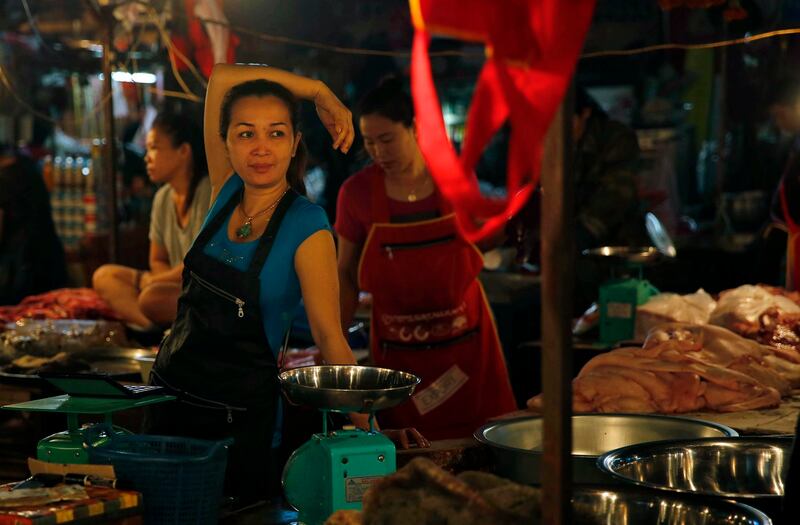Laos has imposed price controls on 23 basic necessities such as pork, rice and natural gas to try to rein in inflation that has surged above 40 percent – controls authorities aim to enforce through fines or even jail time.
But the price limits are making it hard for some merchants to make money.
One pork trader in the capital, Vientiane, told Radio Free Asia that the mandated government price of 75,000 kip (U.S.$4.42) per kilogram isn’t enough.
“For me, I must sell at 80,000 kip (U.S.$4.72) or 85,000 kip (U.S.$5.01) per kilogram,” said the trader, who like others requested anonymity for security reasons. “I only make a small profit. Sometimes I even lose money.”
Authorities are planning to send inspectors to markets to check prices, Vice Minister of Industry and Trade Bountheung Duangsavanh said at a March 7 government meeting.
If retailers sell their products at higher prices than those set by the government, they’ll be re-educated and fined 3 million kip (U.S.$177) to 10 million kip (U.S.$590), a trade official in the resort town of Luang Prabang said.
Or they could face jail time from six months to two years, according to the law.
“We often inspect the prices at the markets; the traders who break the order, will be charged accordingly,” the official said. “We’re doing this to prevent price gouging.”
The prices are set based on current market rates, the official said.
“We’re realistic. We, the government, adjust prices according to the price of fuel and on exchange rates,” the official said. “We’re not controlling the price of everything, just the 23 items.”
A list of 23 items with prices that will be controlled and fixed by the government, which also includes beef, fish, chicken and cement, was published late last month by the Lao Ministry of Industry and Trade.
The move was a response to rising worldwide inflation that has hit Laos especially hard. Government figures showed the rate in Laos surged 41.3% in February, despite measures like import restrictions and the closure of private money exchangers.
Soaring inflation has been driven by a depreciation in the Lao currency – the kip – and declines in foreign investment.

‘It’s never worked’
But one Vientiane resident was skeptical that setting prices and inspecting markets will solve the issue. Prices keep rising anyway.
A bag of rice, for example, is now 600,000 kip (U.S.$35.38), up from 300,000 kip (U.S.$17.69) a year ago, the resident said.
“The government can’t control the prices; they keep going up,” the resident said. “The government has tried to control prices many times before. It’s never worked.”
Another Vientiane pork trader suggested that the government try to control prices at the source by getting farmers to reduce their prices.
“The authorities from the Ministry of Industry and Trade ask us why we’re selling at higher prices, I tell them to ask the farmers,” the trader said.
A Vientiane pig farm owner pointed to the cost of animal feed from Thailand, which is now twice as much as it was a year ago. Transportation costs are also high, the exchange rate with the Thai baht has become less favorable and there are taxes as well, the farm owner said.
Laos will continue to have issues with imports, an economist in the country said. Because of the mountainous terrain, there is only so much agricultural land and Laos will have to continue to bring in even basic necessities from outside the country.
“We want to produce more in this country, but we can’t,” he said.
